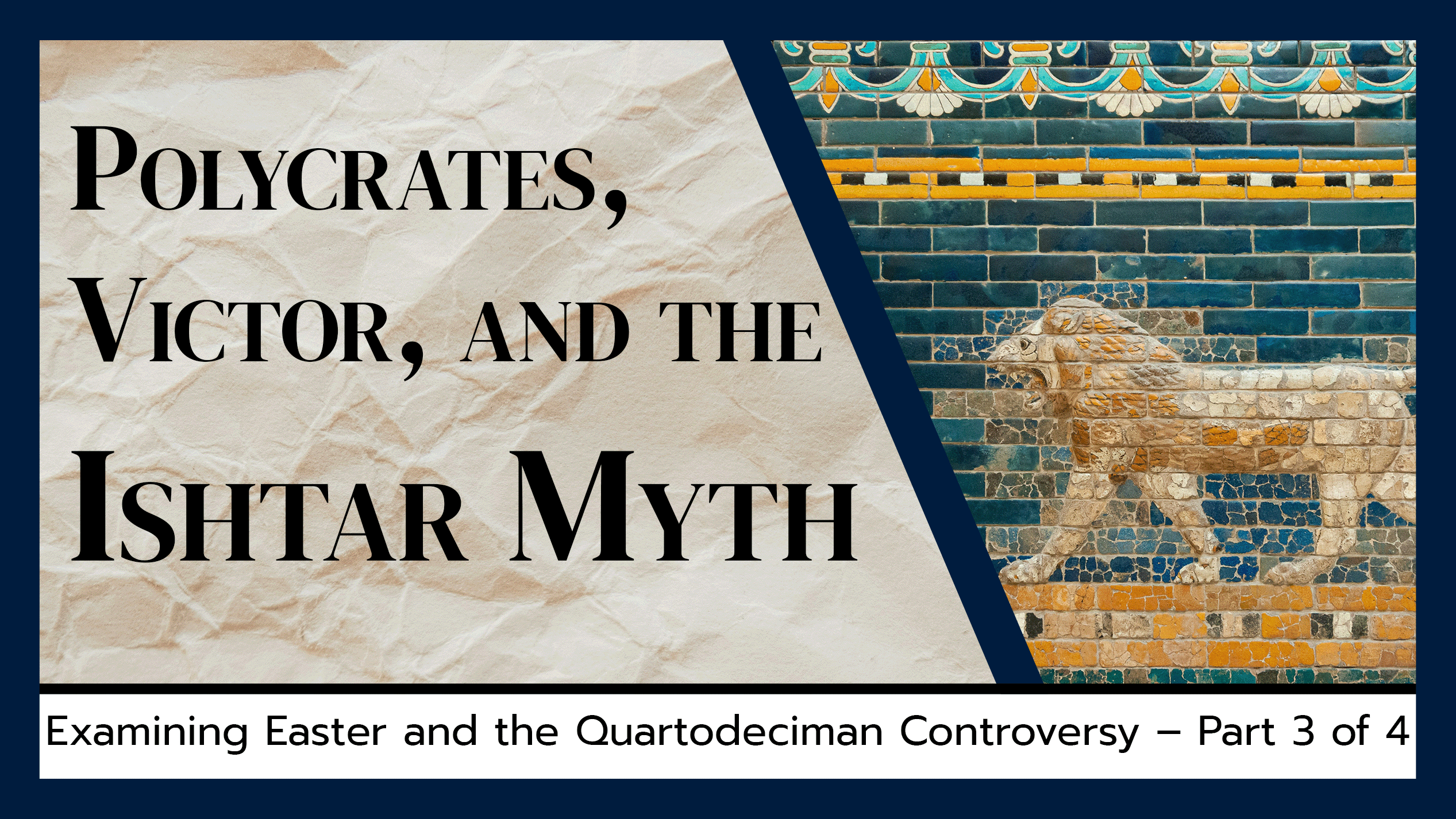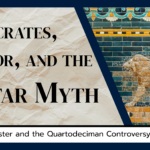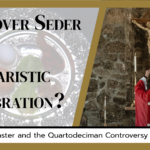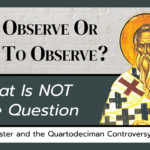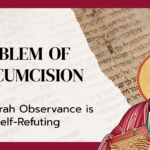In the last few articles, we learned about as much as we can about the dispute between Polycarp and Anicetus. Now, let’s fast forward about 100 years and look at the second time this “Quartodeciman” controversy came up. This time, the argument was between Polycrates the Bishop of Ephesus, and Pope Victor of Rome.
I’ll let Mr. Miller continue the story:
The problem of “to observe Passover or not to observe Passover” never went away and resurfaced with a vengeance around 192 when Victor, the bishop of Rome, contacted the leading presbyter over the churches in Asia minor, Polycrates, and instructed him concerning the following:
You will call a meeting of all the bishops of all the churches in Asia Minor and the surrounding countries
You will instruct them to cease from observing Passover
You will adopt the new tradition we call Easter Sunday
If you don’t, you will be excommunicated from the Roman Church.
Polycrates called the meeting, discussed the list of demands issued by the Roman Bishop Victor all the while being keenly aware of the requirements of the Apostolic Constitutions. After discussion, they wrote a letter giving the unanimous response of all the Bishops present.
Here is the letter in paragraph form…
“[Concerning Passover], we scrupulously observe the exact day; neither adding, nor taking away. For in Asia also great lights have fallen asleep. Among these are the Apostles Philip and John, Polycarp, and others. All these observed the 14th day of the [first] month, in accordance with the Gospel, deviating in no respect, but following the rule of faith. For seven of my relatives were bishops; and I am the eighth. And my relatives ALWAYS observed the day when the people put away the leaven. Exodus 12:15 I have met with the brethren throughout the world, and have gone through every Holy Scripture. I could mention the bishops who were present, whom I summoned at your desire; whose names […] would constitute a great multitude. And they gave their UNANIMOUS consent to the letter. I am not frightened at the things which are said to terrify us. For those who are greater than I have said, “We ought to obey God rather than men.”
So these are quite the bold claims, but is this what the historical record shows? Let’s look at them one by one and see if the primary sources bear this out.
Paschal Fast?
The first claim Mr. Miller made is that the disagreement in the church was about whether or not to observe Passover. As I noted when we examined the Polycarp story, there was not yet enough evidence to determine what exactly the dispute was about. It was “up in the air” so to speak, and it would have been unwise to make a definitive judgment based solely on the evidence we looked at.
However, when we look at the primary sources in regards to the dispute between Polycrates and Victor, the exact nature of the disagreement becomes clearer. Here’s what Eusebius says (emphasis mine):
A question of no small importance arose at that time. For the parishes of all Asia, as from an older tradition, held that the fourteenth day of the moon, on which day the Jews were commanded to sacrifice the lamb, should be observed as the feast of the Saviour’s passover.1687 It was therefore necessary to end their fast on that day, whatever day of the week it should happen to be. But it was not the custom of the churches in the rest of the world to end it at this time, as they observed the practice which, from apostolic tradition, has prevailed to the present time, of terminating the fast on no other day than on that of the resurrection of our Saviour.
Eusebius, Church History (Book V, Chapter XXIII, Paragraph 1)
So the dispute centered around which day should be celebrated as the “feast of the Saviour’s passover”. Apparently, the Church would fast for a period of time leading up to this festival, and there was disunity in regards to when this fast would end. To understand why this was the case, we have to understand the Jewish calendar.
The Jewish calendar is a lunar calendar, meaning it is inseparably connected to the phases of the moon. So a particular day on the Jewish calendar will always coincide with the same phase of the moon. In this case, we’re talking about the night of Passover. According to Leviticus 23:5, God commands that the Passover be celebrated on the 14th of Nisan, which always falls on a full moon, but not always on the same day of the week.
In the gospels, we learn that Christ died right around Passover, with contemporary scholars split between his death falling on either the 14th or the 15th of Nisan. We also know that Christ rose from the dead on the first day of the week (Matthew 28:1, Mark 16:2, Luke 24:1, John 20:1). So we have two pieces of information: the day of the month connected to Jesus’ death, and the day of the week when He rose.
This is what the dispute in the Church stemmed from. In the East (the “parishes of all Asia”), they ended their fast on the 14th of Nisan. This would mean that they would not be commemorating the Resurrection on a Sunday, but it would fall on a different day every year. They were called the Quartodeciman’s because they observed it on the 14th of Nisan (Quartodeciman means 14th). However, the rest of the churches would extend their fast until Sunday, so that they could celebrate the Resurrection on the same day of the week that it had actually occurred.
Nowhere in this does Eusebius say anything about the Asiatic churches observing the Jewish Passover. After all, there is no fast preceding the Passover. I will point out that modern Christians DO observe a fast before Easter Sunday. It’s called Lent.
So, Mr. Miller is just wrong. This wasn’t a debate about whether “to observe Passover or not to observe Passover”. It was simply a calendar dispute, and different churches based their observance on a different aspect of the gospel account. The editor’s footnote in Eusebius concurs with this interpretation (emphasis mine):
The great question of dispute between the church of Asia Minor and the rest of Christendom was whether the paschal communion should be celebrated on the fourteenth of Nisan, or on the Sunday of the resurrection festival, without regard to Jewish chronology. The Christians of Asia Minor, appealing to the example of the apostles, John and Philip, and to the uniform practice of the Church, celebrated the Christian passover always on the fourteenth of Nisan, whatever day of the week that might be, by a solemn fast, and closed the day with the communion in commemoration of the last paschal supper of Christ. The Roman church, on the other hand, followed by all the rest of Christendom, celebrated the death of Christ always on Friday, and his resurrection on the Sunday following the first full moon after the vernal equinox, and continued their paschal fast until the latter day. It thus happened that the fast of the Asiatic Christians, terminating, as it did, with the fourteenth of Nisan, often closed some days before the fast of the other churches, and the lack of uniformity occasioned great scandal.
Eusebius, Church History (Book V, Chapter XXIII, Paragraph 1), Footnote 1687
Having settled that, let’s move on to the next point:
A Council To Decide The Issue?
Mr. Miller says that Pope Victor commanded Polycrates, Bishop of Ephesus, to “call a meeting of all the bishops of all the churches in Asia Minor and the surrounding countries” to discuss the issue.
Eusebius does say that there were several synods held to discuss the matter, but he doesn’t explicitly say they were all ordered by Pope Victor. However, based on something Polycrates says later on, it is reasonable to assume this was the case. Let’s look at what Eusebius says about these synods (emphasis mine):
2. Synods and assemblies of bishops were held on this account,1688 and all, with one consent, through mutual correspondence drew up an ecclesiastical decree, that the mystery of the resurrection of the Lord should be celebrated on no other but the Lord’s day, and that we should observe the close of the paschal fast on this day only. There is still extant a writing of those who were then assembled in Palestine, over whom Theophilus,1689 bishop of Cæsarea, and Narcissus, bishop of Jerusalem, presided. And there is also another writing extant of those who were assembled at Rome to consider the same question, which bears the name of Bishop Victor;1690 also of the bishops in 242 Pontus over whom Palmas,1691 as the oldest, presided; and of the parishes in Gaul of which Irenæus was bishop, and of those in Osrhoëne1692 and the cities there; and a personal letter of Bacchylus,1693 bishop of the church at Corinth, and of a great many others, who uttered the same opinion and judgment, and cast the same vote.
3. And that which has been given above was their unanimous decision.1694
Eusebius, Church History (Book V, Chapter XXIII, Paragraphs 2-3)
There were apparently several groups of bishops who assembled, and they all agreed that Christ’s resurrection should always be observed on a Sunday. These included the bishops of Palestine, the Bishop of Rome, the bishops of Pontus, the bishops in Gaul (which included Irenaeus), the bishops of Osrhoëne (Mesopotamia), as well as the bishop of Corinth.
Perhaps the most interesting part of this is the fact that Irenaeus was among the bishops who voted for the observance of the Resurrection on Sunday. As I’ve said before, Irenaeus was a disciple of Polycarp, who was a Quartodeciman. This means that Irenaeus likely adhered to the Quartodeciman observance for a good portion of his life. The fact that he didn’t feel that this disagreement was worth dividing the church over, choosing instead to vote in unison with his brother bishops, should tell us something.
Another Synod?
In addition to the synods that we’ve just mentioned, there was one more synod, but this one did not agree with the conclusions of the other synods.
1. But the bishops of Asia, led by Polycrates, decided to hold to the old custom handed down to them.1695 He himself, in a letter which he addressed to Victor and the church of Rome, set forth in the following words the tradition which had come down to him:
Eusebius, Church History (Book V, Chapter XXIV, Paragraph 1)
Now, we’ll get to what Polycrates said to Victor in a moment, but I first want to address the supposed “demands” that, according to Mr. Miller, Pope Victor required Polycrates to comply with.
1. You will call a meeting of all the bishops of all the churches in Asia Minor and the surrounding countries
As we already saw, despite the fact that Eusebius does not explicitly say Pope Victor called the councils, it is more than reasonable to assume that this was the case.
2. You will instruct them to cease from observing Passover
Since Victor had not sent any commands to Polycrates at this point, this accusation is untrue on its face. In addition, as I have already extensively demonstrated that the Quartodeciman’s were not celebrating the Jewish Passover, this command wouldn’t make any sense. If anything, Victor would have commanded them to stop observing on the 14th of Nisan, but that would have simply been out of a desire to unify the Church.
3. You will adopt the new tradition we call Easter Sunday
This is probably the most severe error Mr. Miller has made so far. The truth is that there is no possible way that Victor could have commanded Polycrates to do this, and there is a very simple reason for this. To unpack this, let’s look at the etymology of the word Easter.
The Ishtar Connection?
Many people have made the claim that the word Easter is derived from the name of the Babylonian fertility goddess Ishtar. This claim can be found in newspaper articles, bible commentaries, as well as extremely sketchy Torah Observant blogs.
This is despite the fact that there is simply not a shred of evidence to back this up. According to the Oxford English Dictionary, the word Easter comes from the old Germanic word ōster, meaning “dawn” or “east”.
According to the 7th-century historian St. Bede, this was a word that originated from a Germanic goddess named Eostre, and the ancient Germanic people knew the month we call April as Eostermonath (literally Eostre-month) because she was supposedly celebrated around the vernal equinox. We call the holiday “Easter” because we speak English (which derives from German) and because it usually falls somewhere in April.
However, St. Bede is the first (and only) reference we have to such a goddess. Scholars are divided as to whether this goddess was actually worshipped by the Germanic pagans, or whether Bede was merely speculating on the etymological origins of the name of the month.
At any rate, whether this Germanic goddess had any connection to the modern word Easter is irrelevant to the Quartodeciman controversy in the early church. This is because in Latin and Greek, the languages in use by the early Church, the word for “Easter” is actually “Pascha”, which derives unsurprisingly from the Hebrew “Pesach”.
So to tie this back in with Mr. Miller’s claim, Pope Victor COULD NOT have told Polycrates to start observing “Easter Sunday”, because it simply wasn’t called that. There was no new pagan observance introduced to “replace Passover”. Victor, and everyone else involved, referred to the holiday as “Pascha” because the word “Easter” wouldn’t exist for about a few hundred more years, and would then find its origin in an entirely different part of the world.
So where did Mr. Miller come up with this? I don’t know for sure, but I’m going to be generous and assume that Mr. Miller did not invent this claim. Most likely, he heard this assertion (or something very similar) somewhere else , and didn’t bother to check his sources before repeating it. This is unfortunate, because this claim was basically holding up Mr. Miller’s entire argument. If no one introduced a “new pagan holiday”, what was the Quartodeciman controversy about? As I started to prove in the last section and will elaborate more going forward, it was about when to celebrate, not what to celebrate.
4. If you don’t, you will be excommunicated from the Roman Church.
Now this claim is almost 100% true. Pope Victor did threaten Polycrates with excommunication, but since it did not happen at this point in the story, I will not address this just yet.
Polycrate’s Dissent
So let’s go back and look at what Polycrates said in response to the other synods which had decided in favor of a Sunday observance. It’s fairly long, but worth quoting in full:
2. “We observe the exact day; neither adding, nor taking away. For in Asia also great lights have fallen asleep, which shall rise again on the day of the Lord’s coming, when he shall come with glory from heaven, and shall seek out all the saints. Among these are Philip, one of the twelve apostles, who fell asleep in Hierapolis; and his two aged virgin daughters, and another daughter, who lived in the Holy Spirit and now rests at Ephesus; and, moreover, John, who was both a witness and a teacher, who reclined upon the bosom of the Lord, and, being a priest, wore the sacerdotal plate.
3. He fell asleep at Ephesus.
4. And Polycarp1697 in Smyrna, who was a bishop and martyr; and Thraseas,1698 bishop and martyr from Eumenia, who fell asleep in Smyrna.
5. Why need I mention the bishop and martyr Sagaris1699 who fell asleep in Laodicea, or the blessed Papirius,1700 or Melito,1701 the Eunuch who lived altogether in the Holy Spirit, and who lies in Sardis, awaiting the episcopate from heaven, when he shall rise from the dead?
6. All these observed the fourteenth day of the passover according to the Gospel, deviating in no respect, but following the rule of faith.1702 And I also, Polycrates, the least of you all, do according to the tradition of my relatives, some of whom I have closely followed. For seven of my relatives were bishops; and I am the eighth. And my relatives always observed the day when the people1703 put away the leaven.
7. I, therefore, brethren, who have lived sixty-five years in the Lord, and have met with the brethren throughout the world, and have gone through every Holy Scripture, am not affrighted by terrifying words. For those greater than I have said ‘We ought to obey God rather than man.’”1704
8. He then writes of all the bishops who were present with him and thought as he did. His words are as follows:
“I could mention the bishops who were present, whom I summoned at your desire;1705 whose names, should I write them, would constitute a great multitude. And they, beholding my littleness, gave their consent to the letter, knowing that I did not bear my gray hairs in vain, but had always governed my life by the Lord Jesus.”
Eusebius, Church History (Book V, Chapter XXIV, Paragraphs 2-8)
So right out of the gate, Polycrates gives us a clue about where he differs from Victor and the other synods. He says “We observe the exact day; neither adding, nor taking away.” This is in contrast to always observing it on a Sunday, regardless of whether it aligns with the “exact day”.
After listing out numerous early church leaders who supported his position, Polycrates states “All these observed the fourteenth day of the passover according to the Gospel, deviating in no respect, but following the rule of faith.” And later on, he says “And my relatives always observed the day when the people put away the leaven.” A superficial reading of this seems to support a Torah Observant reading, but in truth, this is ambiguous at best.
The first reason why someone may say this proves the Torah Observant position is the fact that Polycrates calls the feast “Passover”. However, as I stated earlier, the Greek word for this was Pascha, and it was used by both sides of the dispute to describe the observance. In reality, the crucial part of Polycrates’ statement is the fact that they “observed the fourteenth day “. Once again, we have seen nothing to suggest there was a disagreement about what to observe, it was merely a dispute about when to observe it.
Not so fast, you may say, Polycrates says that his relatives observed the day by putting away the leaven.
Actually, he doesn’t say that. He says that they observed “the day when the people put away the leaven”. The Torah required that the Israelites have removed all leaven from their homes by the 15th of Nisan, so traditionally it would be removed on the 14th. This was the day that the Quartodecimans were observing “Pascha”. Polycrates is not making a statement about how he observes the day, he’s merely specifying which day.
If he were describing how he observes it, we would expect him to mention the week during which no leaven is consumed. After all, the Feast of Unleavened Bread lasts an entire week, not just one day. However, he doesn’t mention anything about a week, because he’s only interested in making it clear that “the exact day” is “the day when the people put away the leaven” (i.e. the 14th of Nisan).
Beyond that, I want to draw attention to the fact that Polycrates mentions in paragraph 8 that the bishops were summoned “at your [i.e. Victor’s] desire”. As I said earlier, despite the fact that Eusebius doesn’t explicitly say Victor called the councils, these words of Polycrates demonstrate that this was the case.
Victor’s Threat
So what was Pope Victor’s response to Polycrates’ categorical non-compliance? Well, as Mr. Miller alluded to, Victor decided the best course of action was to excommunicate all the Churches of Asia! Here’s what Eusebius says:
9. Thereupon Victor, who presided over the church at Rome, immediately attempted to cut off from the common unity the parishes of all Asia, with the churches that agreed with them, as heterodox; and he wrote letters and declared all the brethren there wholly excommunicate.
Eusebius, Church History (Book V, Chapter XXIV, Paragraph 9)
Now, there is a scholarly dispute about whether Victor actually excommunicated the Asian Churches or merely threatened to do so. I’m not qualified to make a call one way or the other, but I honestly don’t think it’s relevant. What’s relevant is the reaction of the other bishops to Victor’s threats.
10. But this did not please all the bishops. And they besought him to consider the things of peace, and of neighborly unity and love. Words of theirs are extant, sharply rebuking Victor.
11. Among them was Irenæus, who, sending letters in the name of the brethren in Gaul over whom he presided, maintained that the mystery of the resurrection of the Lord should be observed only on the Lord’s day. He fittingly admonishes Victor that he should not cut off whole churches of God which observed the tradition of an ancient custom and after many other words he proceeds as follows:
Eusebius, Church History (Book V, Chapter XXIV, Paragraph 10-11)
So essentially, the other bishops did not agree with Victor’s strategy for handling the Quartodeciman controversy. Even Irenaeus, who agreed with Victor when it came to when the resurrection should be celebrated, rebuked him over this. On a side note, I would argue that Irenaeus doesn’t question Victor’s authority to excommunicate the Asian Churches, but rather whether it is a prudent decision. That, however, is a discussion for a different article.
So, what were some of the things Irenaeus said to Victor? Let’s keep reading:
12. “For the controversy is not only concerning the day, but also concerning the very manner of the fast. For some think that they should fast one day, others two, yet others more; some, moreover, count their day as consisting of forty hours day and night.1708
13. And this variety in its observance has not originated in our time; but long before in that of our ancestors.1709 It is likely that they did not hold to strict accuracy, and thus formed a custom for their posterity according to their own simplicity and peculiar mode. Yet all of these lived none the less in peace, and we also live in peace with one another; and the disagreement in regard to the fast confirms the agreement in the faith.”
Eusebius, Church History (Book V, Chapter XXIV, Paragraph 12-13)
Once again, this further confirms that this is not about the Jewish Passover. Irenaeus is telling us that part of the Quartodeciman controversy involved a disagreement about how long to fast before observing “Pascha”. As I pointed out earlier, the Torah doesn’t command anyone to fast in the days or hours leading up to Passover.
In Summary
So to take this back to Mr. Miller’s article, let’s look at his summary of the Quartodeciman situation, and find out what he gets right, and what he gets wrong.
Let’s review what ALL the Bishops of all the churches in Asia Minor and the surrounding countries concluded…
1. We will continue to follow the teachings of the Apostles (Polycarp being in agreement with them)
So the first thing he says is true. The bishops in Asia Minor DID profess that they would continue to follow the teachings of the Apostles. They (along with all the other bishops) were very devoted to following and passing on the truth of the Gospel.
2. We will continue to follow the Rule of Faith
This naturally follows from the first, and thus it is also true. The “Rule of faith” is essentially a synonym for “the true faith” or “the teachings of the Apostles”, so yes, they wholeheartedly affirmed their dedication to it.
3. We will continue to follow the Apostolic Constitutions
This is not found in the account of the Asiatic synod, and may or may not actually be true. What Mr. Miller is referring to is a 3rd-century document called the “Didascalia Apostolorum”, which is filled with guidelines and instructions for the early Christians. It should NOT be confused with the late 4th century “Apostolic Constitutions” which is a separate document and was not around at the time of the Quartodecimans. The “Didascalia” presents itself as if it was written by the 12 apostles, although this is likely not the case.
Mr. Miller cites Epiphanius to support the idea that the Quartodeciman appealed to the “Didascalia” to defend their position. Unfortunately, he does not give us a specific quotation, and I have been unable to trace the idea back to the “Didascalia”.
I will probably write another article where I examine Epiphanius’ response to Quartodecimanism, so I won’t say too much more about this here. I won’t rule out the possibility that the Asiatic bishops supported their position with the “Didascalia”, but Mr. Miller has certainly not demonstrated that.
4. We read through every Holy Scripture (including the Torah and Paul’s letters) and have found nothing that would authorize us to replace obedience to Torah regarding required observation on the 14th day of the first month in observance of Passover with a man-made tradition.
Here is where Mr. Miller starts to go off-track. Polycrates and the bishops never even mentioned the Torah in their response, and yet Mr. Miller is trying to make it seem as if “Torah Observance” is the driving force behind their refusal to observe the holiday on any day other than the 14th. As I have shown, no one involved in the controversy was observing “Passover” in a “Torah Observant” way.
5. Understood that the keeping of the Torah was a requirement (not an invitation) and could not be set aside and substituted with a man-made tradition known as Easter Sunday.
This is completely untrue and seriously misleading. The bishops did not say anything about the Torah, much less Torah Observance being “a requirement (not an invitation)”. Furthermore, although they did consider celebrating the resurrection on a Sunday to be a “man-made tradition” (more or less), they did NOT call it “Easter Sunday” because the word Easter didn’t even exist yet!
It is immensely important to recognize that the Romans and the Quartodecimans did not believe they were celebrating two different holidays, but merely that they differed on what day to celebrate.
Ishtar Eggs?
Before I close out this article, I want to go back for a second and briefly touch on the origins of the popular Easter Bunny and Easter Egg traditions. As I’m sure most of my readers are aware, the usual explanation that is offered is that these are pagan fertility symbols that can be traced back to the Babylonian goddess Ishtar (whom I briefly mentioned earlier in conjunction with the word Easter).
Yet again, however, this is a theory that is not based on any historical evidence. According to the Encyclopedia Britannica, Ishtar’s symbols were the lion and the eight-pointed star, not the rabbit and the egg.
If there is any sort of pagan origin to the Easter egg, it came from the Zoroastrian practice of decorating eggs for their New Year celebration. From there, Persian Christians would have adopted the practice, changing the meaning to symbolize Christ’s death and resurrection.
However, some dispute this theory, instead claiming that Easter eggs originated from the medieval practice of fasting from animal products (including eggs) for Lent.
To be quite honest, I don’t care which of these theories is the true one. Easter eggs are not an essential part of the holiday and it is absolutely possible to celebrate Easter without having anything to do with decorative eggs. If you think Easter eggs are pagan and therefore don’t want to have anything to do with them, fine! No one should force you to. On the flip side, though, since there isn’t conclusive proof that they are pagan, no one should be condemned for treating them as the harmless game that they are! Frankly, there are way more important things to worry about (and divide the Church over) than Easter eggs.
The Easter Bunny is similar, although in this case, we know the origins of the Easter Bunny and it wasn’t pagan. According to most sources, the legend of an egg-laying rabbit that comes around at Easter originates in 17th-century Germany. Although to be perfectly honest, Easter bunnies are just really darn creepy, and I will be the first person to say that the tradition needs to die (at least in its present form).
Anyway, I want to reiterate the fact that the origins of Easter Bunnies and Eggs (pagan or otherwise) don’t affect the Easter celebration at all. As I have shown throughout the last three articles, the holiday of Easter (or Pascha as it was called) has been observed by the Church since the 2nd century. It was not a pagan accretion that slowly crept in through Gentile converts, but rather it was an observance that naturally followed from the Christian faith and the fulfilled Passover.
Next time, in the final part of this series, I will discuss the myth that Constantine changed Passover to Easter at the Council of Nicea. I will examine his famous letter where he expresses his desire to be separate from the “detestable Jewish crowd” and provide a little background history and context.
Be sure to subscribe using the form on the right so you are notified when I post it!
May God Bless You!
